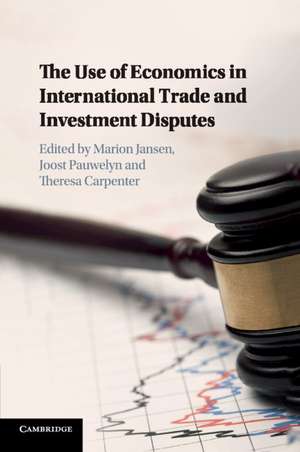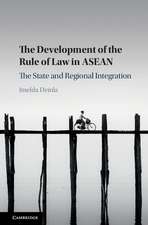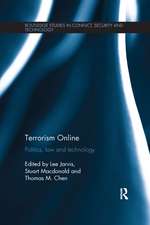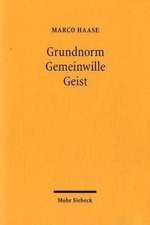The Use of Economics in International Trade and Investment Disputes
Editat de Theresa Carpenter, Marion Jansen, Joost Pauwelynen Limba Engleză Paperback – 19 dec 2018
| Toate formatele și edițiile | Preț | Express |
|---|---|---|
| Paperback (1) | 323.65 lei 6-8 săpt. | |
| Cambridge University Press – 19 dec 2018 | 323.65 lei 6-8 săpt. | |
| Hardback (1) | 840.08 lei 6-8 săpt. | |
| Cambridge University Press – 19 apr 2017 | 840.08 lei 6-8 săpt. |
Preț: 323.65 lei
Nou
Puncte Express: 485
Preț estimativ în valută:
61.93€ • 66.23$ • 51.64£
61.93€ • 66.23$ • 51.64£
Carte tipărită la comandă
Livrare economică 17 aprilie-01 mai
Preluare comenzi: 021 569.72.76
Specificații
ISBN-13: 9781316508053
ISBN-10: 1316508056
Pagini: 416
Dimensiuni: 150 x 227 x 20 mm
Greutate: 0.56 kg
Editura: Cambridge University Press
Colecția Cambridge University Press
Locul publicării:New York, United States
ISBN-10: 1316508056
Pagini: 416
Dimensiuni: 150 x 227 x 20 mm
Greutate: 0.56 kg
Editura: Cambridge University Press
Colecția Cambridge University Press
Locul publicării:New York, United States
Cuprins
1. Introduction: the use of economics in international trade and investment disputes Marion Jansen, Joost Pauwelyn and Theresa Carpenter; Part I. The Use of Economics in International Trade and Investment Disputes: A Practitioner's View: 2. Integrating economic analysis into WTO dispute settlement practice: a view from the trenches Robert Teh and Alan Yanovich; 3. Present at the creation: economists and accountants in international trade law practice Thomas Graham; 4. The role of economics in WTO dispute settlement and choosing the right litigation strategy - a practitioner's view Christian Lau and Simon Schropp; 5. On interpretation and economic analysis of law David Unterhalter; 6. The client's perspective James Flett; 7. The use of economics in competition law: what works and what doesn't across national jurisdictions? Bruce Malashevich; Part II. The Use of Economics in International Trade Disputes: Economic Versus Legal Thinking: 8. What to do if economic insights are disputed: on the challenge to deal with competing and evolving theories or empirics in international trade disputes Anne van Aaken; 9. Lost in translation: communication and interpretation challenges related to economic evidence in trade disputes Marion Jansen and Marios Iacovides; 10. Land rich and cash poor? The reluctance of the WTO dispute settlement system to entertain economics expertise: an institutional analysis Petros Mavroidis and Damien Neven; 11. The economics of actionable subsidy disputes Jorge Miranda; 12. In search of a 'genuine and substantial' cause: the analysis of causation in serious prejudice claims Pablo M. Bentes; 13. The games we play - simulation models in merger analysis and their potential use in trade litigation Amar Breckenridge; Part III. The Use of Economics in International Investment Disputes: Liability and Damages: 14. Aligning loss, liability and damages: towards an integrated assessment of damages in investment arbitration Wolfgang Alschner; 15. An economic assessment of contracts and requests for contract reform and damages in international arbitration Bastian Gottschling and Willis Geffert; 16. Economics in investor-state arbitration beyond quantum Carla Chavich and Pablo Lopez; 17. Assessing investor damages involving publicly traded companies – with examples from the Yukos' cases Manuel A. Abdala and Alan Rozenberg; 18. From the law of valuation to valuation of law? On the interplay of international law and economics in fair-market valuation Fuad Zarbiyev; Conclusion Theresa Carpenter, Marion Jansen and Joost Pauwelyn; Appendix. Guidelines for best practices for the use of economics in WTO dispute settlement Theresa Carpenter, Marion Jansen and Joost Pauwelyn.
Recenzii
'Government officials and commercial litigants increasingly rely on technical, economic analysis in their international trade and investment disputes. At the same time, the public has also become more motivated to understand how the legal decisions arising from the World Trade Organization and investor-state dispute settlement - which they perceive as potentially constraining their policymakers' access to regulation - are being made. Jansen, Pauwelyn, and Carpenter bring together scholars from a range of disciplines to provide this much-needed volume. Their collection investigates the benefits and costs of integrating economic insights into international jurisprudence, as well as identifying perils for the road ahead.' Chad P. Bown, Peterson Institute for International Economics
'In the field of competition policy the use of economic analysis has been the norm for many recent decades. This practice is now gradually becoming the norm in trade and investment disputes as well. The outstanding contributions from practitioners and academics in this fascinating volume demonstrate that together with a deep understanding of the law economic analysis is absolutely key in trade and investment disputes just as it is in competition policy. It is heartening to see that law and economics are again used together in modern regulatory cases as they were in classical times.' André Sapir, Université libre de Bruxelles, Belgium and former Economic Advisor to the President of the European Commission
'This very useful volume contains analyses by leading scholars and practitioners of the increasing use of economic analysis in WTO dispute resolution, investor-state arbitration, and competition law. This includes the expected areas - such as causation, market definition, likeness, etc., as well as newer developments such as necessity and commercial impact, where the use of economists is an emerging trend. It will be very helpful for those trying to understand the areas - and their interrelationships - and also those trying to win their cases.' Gary Horlick, Adjunct Professor of Law, Georgetown University Law Center, Washington, DC
'This timely and critical publication compiles innovative insights from first-range experts on the use of economics in international trade and investment dispute settlement. It offers lessons learnt from state-state dispute settlement in the WTO and investor-state dispute settlement under international investment agreements. It provides practical guidance on how economists and lawyers can work together to create synergies between the two disciplines. A 'must-read' for practitioners in the field, the book will undoubtedly also inspire a much broader range of policymakers and other stakeholders that are grappling with the interface of law and economics in the pursuit of today's sustainable development imperative.' James Zhan, Director, Investment and Enterprise Division, United Nations Conference on Trade and Development
'From my perspective of investor-state dispute settlement, this is a most welcome contribution that explores the interactions between law and economics present at many stages of an investment arbitration, not only at the quantum stage but equally at the level of liability - what are the economics of the project or contract? How to assess causation? Or contributory negligence? The search for coherence between trade and investment law, which is one of the themes of the book, can also provide guidance to investment specialists. In other words, for many reasons, a very valuable new tool.' Gabrielle Kaufmann-Kohler, Geneva University Law School and Attorney at law with Lévy Kaufmann-Kohler
'The dispute settlement system at the WTO is unique among international organisations and any contribution that seeks to strengthen the system is most welcome. This book draws upon investor-state arbitration and competition/antitrust disputes to focus on the application of economics to international trade law and specifically WTO law. It collects precious insights from practitioners and academics, bringing economists and lawyers together to work towards solutions that are credible and that enhance the system. It is a most welcome contribution.' Karl Brauner, Deputy Director, World Trade Organization
'In the field of competition policy the use of economic analysis has been the norm for many recent decades. This practice is now gradually becoming the norm in trade and investment disputes as well. The outstanding contributions from practitioners and academics in this fascinating volume demonstrate that together with a deep understanding of the law economic analysis is absolutely key in trade and investment disputes just as it is in competition policy. It is heartening to see that law and economics are again used together in modern regulatory cases as they were in classical times.' André Sapir, Université libre de Bruxelles, Belgium and former Economic Advisor to the President of the European Commission
'This very useful volume contains analyses by leading scholars and practitioners of the increasing use of economic analysis in WTO dispute resolution, investor-state arbitration, and competition law. This includes the expected areas - such as causation, market definition, likeness, etc., as well as newer developments such as necessity and commercial impact, where the use of economists is an emerging trend. It will be very helpful for those trying to understand the areas - and their interrelationships - and also those trying to win their cases.' Gary Horlick, Adjunct Professor of Law, Georgetown University Law Center, Washington, DC
'This timely and critical publication compiles innovative insights from first-range experts on the use of economics in international trade and investment dispute settlement. It offers lessons learnt from state-state dispute settlement in the WTO and investor-state dispute settlement under international investment agreements. It provides practical guidance on how economists and lawyers can work together to create synergies between the two disciplines. A 'must-read' for practitioners in the field, the book will undoubtedly also inspire a much broader range of policymakers and other stakeholders that are grappling with the interface of law and economics in the pursuit of today's sustainable development imperative.' James Zhan, Director, Investment and Enterprise Division, United Nations Conference on Trade and Development
'From my perspective of investor-state dispute settlement, this is a most welcome contribution that explores the interactions between law and economics present at many stages of an investment arbitration, not only at the quantum stage but equally at the level of liability - what are the economics of the project or contract? How to assess causation? Or contributory negligence? The search for coherence between trade and investment law, which is one of the themes of the book, can also provide guidance to investment specialists. In other words, for many reasons, a very valuable new tool.' Gabrielle Kaufmann-Kohler, Geneva University Law School and Attorney at law with Lévy Kaufmann-Kohler
'The dispute settlement system at the WTO is unique among international organisations and any contribution that seeks to strengthen the system is most welcome. This book draws upon investor-state arbitration and competition/antitrust disputes to focus on the application of economics to international trade law and specifically WTO law. It collects precious insights from practitioners and academics, bringing economists and lawyers together to work towards solutions that are credible and that enhance the system. It is a most welcome contribution.' Karl Brauner, Deputy Director, World Trade Organization
Descriere
Containing contributions from both academic experts and practitioners, and from economic and legal experts, this book explores the use of economics in international economic law.












